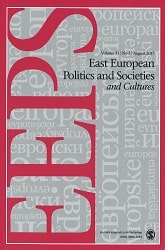Metaphor and Irony in the Public Criminological Discourse of Lithuania
Metaphor and Irony in the Public Criminological Discourse of Lithuania
Author(s): Dalia GedzevičienėSubject(s): Media studies, Pragmatics, Sociolinguistics, Cognitive linguistics, Criminology, Rhetoric
Published by: SAGE Publications Ltd
Keywords: metaphor; irony; discourse analysis; crime; criminal;
Summary/Abstract: This article discusses metaphor and irony as discursive strategies employed by the Lithuanian media while construing the imagery of crime, criminal, and criminality. The method applied to analyse metaphor and irony in Lithuanian criminological discourse combines the framework offered by conceptual metaphor theory with corpus linguistics. First of all, metaphorical and ironical expressions were inventoried, and then conceptual paradigms were reconstructed from them. The conceptual-level analysis revealed that the relations between the conceptual domains of metaphor and irony are processed by different types of mapping (similarity [metaphor] vs. dissimilarity [irony]). Despite differences in the processing of cross-domain mapping, metaphor and irony realised in public criminological discourse carry out the same or very similar rhetorical and social functions. The main function of these discursive strategies is the vivid expression of emotional attitudes and values directed at the criminal—the text adresser evaluates the criminal and crime negatively, dissociates from the offender, and isolates him symbolically from our community. In this way, the contemporary Lithuanian media constructs and shapes the community’s approach to particular social phenomena—crime, criminal, and criminality.
Journal: East European Politics and Societies
- Issue Year: 33/2019
- Issue No: 02
- Page Range: 400-422
- Page Count: 23
- Language: English
- Content File-PDF

